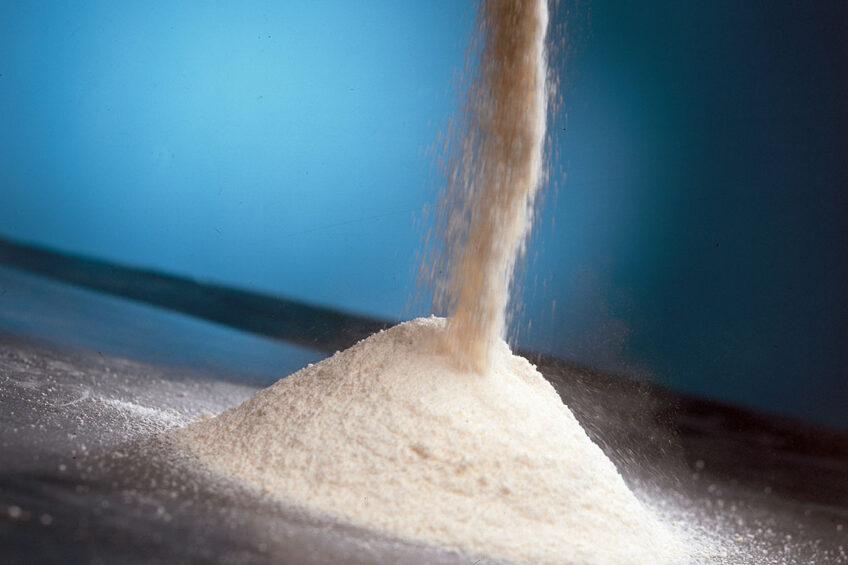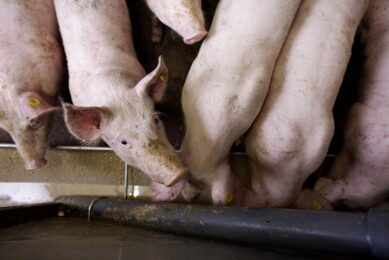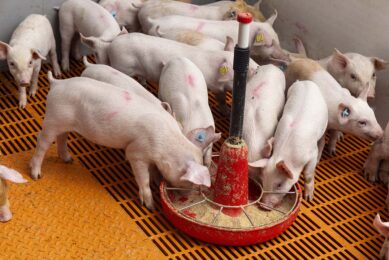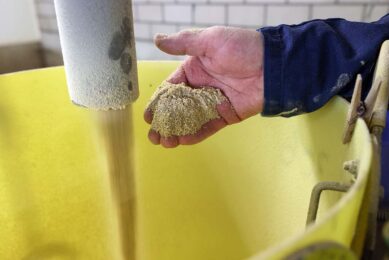Amino acids to overcome heat stress problems

Grower pigs can feel the negative effects of heat stress in various ways. To overcome this, a nutritional strategy of lowering crude protein levels and stepping up the amino acid levels can help. The type of amino acids, however, makes all the difference.
Pigs exposed to an ambient temperature of 31°C or more show signs of heat stress, making it one of the biggest challenges for pig production in many countries. Pigs are sensitive to heat, and under heat stress they typically reduce voluntary feed intake by 20–40% to reduce heat production and maintain thermal homeostasis. Lowering feed intake directly reduces nutrient intake and availability for the pigs. Under heat stress, pigs also have increased blood flow to the external surface, such as the face and neck, to dissipate heat. However, this reduces oxygen and nutrient supply to the internal organs, causing impaired gut integrity.
Heat stress exposure can also lead to oxidative stress, causing cell membrane damage associated with increased use of amino acids for antioxidant function, which then reduces amino acids available for growth. All these factors cause a reduction in pig performance, resulting in economic losses for swine production (see Figure 1).

As well as adequate farm management (ventilation, stocking density; cooling, water intake), nutritional strategies (low protein diets and feed additives) can mitigate the negative effects of heat stress in pigs.
Researchers at Evonik conducted two experiments in collaboration with the Universidad Autónoma de Baja California in Mexicali, Mexico, to determine the effect of dietary level and whether the form of amino acids affects nutrient utilisation and growth of heat-stressed pigs.

Trial results: Experiment 1
In experiment 1, to determine the effect of heat stress on the performance of pigs fed high or low crude protein diet, pigs of roughly 31 kg were assigned to three treatments for 21 days.
- Treatment 1 was a 22% high crude protein (CP) diet based on wheat, soybean meal and canola oil (without supplemental amino acids) but adequate in all amino acids (standardised ileal digestible [SID] lysine of 0.98%) according to the National Research Council (2012). Pigs were kept under thermoneutral conditions with ambient temperatures of 20–24°C.
- Treatment 2 was the same as treatment 1, but pigs were kept in heat stress conditions with ambient temperatures in the range 25–43°C.
- Treatment 3 was a 14% low CP diet based on wheat, soybean meal and nine supplemental amino acids, and adequate in all amino acids (0.98% SID lysine), but pigs were kept under heat stress conditions.
The main results of experiment 1 are shown in Figure 2. Compared with pigs kept in thermoneutral conditions, exposure to heat stress reduced feed intake and average daily gain (ADG) of pigs fed both high CP and low CP diets. Under heat stress, reducing dietary CP from 22% to 14% significantly improved gain:feed (G:F) efficiency, which was similar to pigs kept under thermoneutral conditions.

Trial results: Experiment 2
A simple approach to counteract reduced amino acids intake due to low feed intake is to supply more amino acids in the diet. As such, the aim of experiment 2 was to determine the effect of extra amino acid supply from protein-bound or free amino acids on performance and serum urea nitrogen of pigs under heat stress with ambient temperatures in the range 25–43°C.
Growing pigs of roughly 34 kg were assigned to three diets for 21 days.
- Diet 1 was the control diet based on wheat, soybean meal and three supplemental amino acids and adequate in amino acids (15.1% CP; 0.98% SID lysine).
- Diet 2 was the same as the control diet plus 25% extra essential amino acids (19.0% CP; 1.23% SID lysine) supplied by adding more soybean meal as intact protein.
- Diet 3 was the same as the control diet plus 25% more of nine essential amino acids (16.1% CP; 1.22% SID lysine) by adding nine supplemental amino acids.
As shown in Figure 3, feed intake was not different among the treatments. Compared with the control diet, supplying extra essential amino acids using crystalline amino acids increased ADG by 18% and G:F by 13 points. There was only a trend for improved G:F by increasing soybean meal.
The concentration of serum urea nitrogen in pigs under heat stress is shown in Figure 4. Compared with the control diet or diet 3, serum urea nitrogen at day 20 was higher in pigs fed diet 2, indicating that 25% extra supply of amino acids by adding more soybean meal resulted in increased excess amino acids associated with reduced amino acid utilisation. Lower serum urea nitrogen, on the other hand, indicates improved amino acid utilisation associated with a reduced need for deamination of excess amino acids.

Crystalline amino acids
Based on these results, lowering dietary CP content from 22% to 14% and balancing with supplemental amino acids improves G:F efficiency of growing pigs under heat stress conditions. Supplying an increased amount of essential amino acids (25% above requirement) to a low CP diet using crystalline amino acids rather than intact protein improves the impaired performance of pigs under heat stress conditions.
References available on request.











